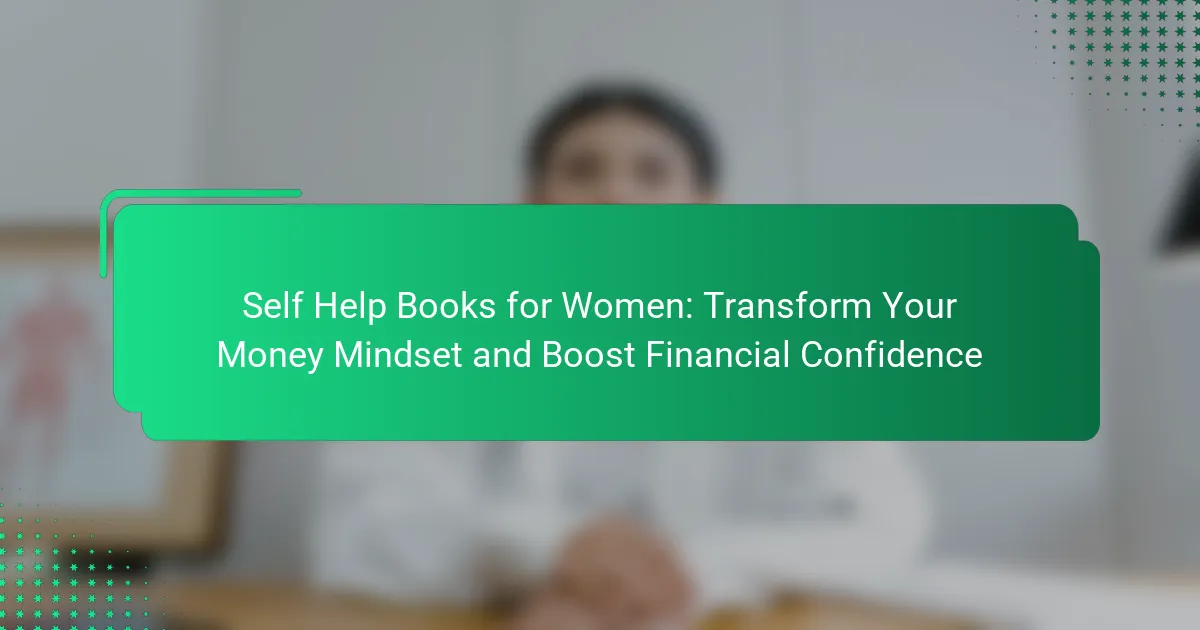Transforming your money mindset is essential for boosting financial confidence. Self-help books for women provide practical strategies, emotional support, and personal growth. They address unique financial challenges, promote a positive relationship with money, and offer actionable steps for overcoming obstacles. Engaging with these resources empowers women to take control of their financial futures.
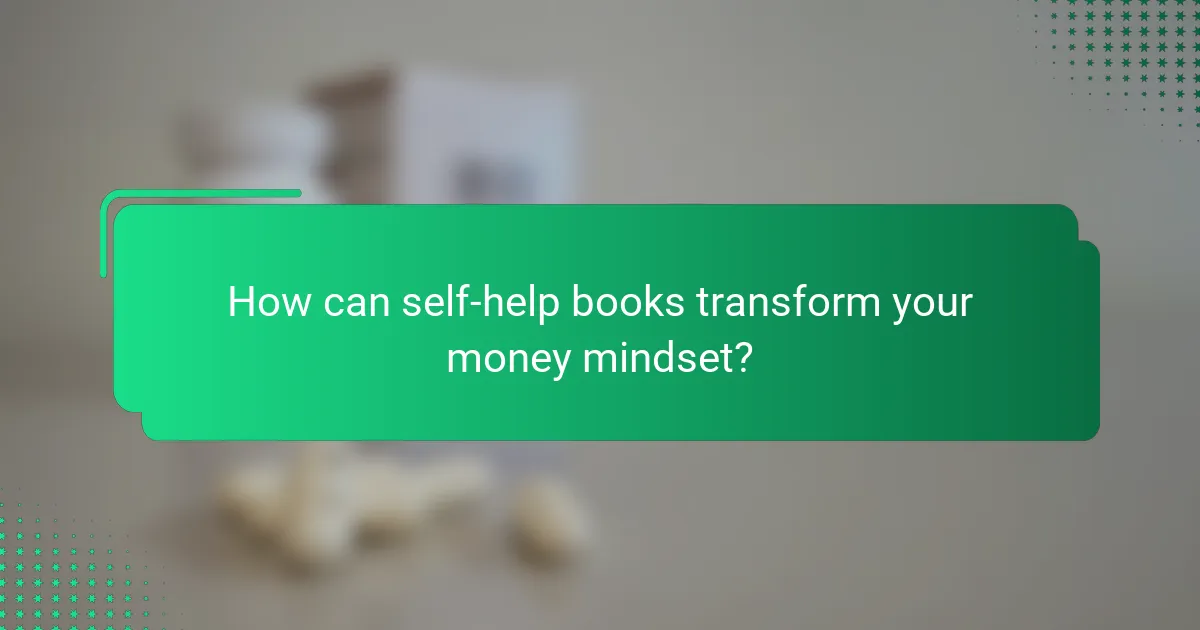
How can self-help books transform your money mindset?
Self-help books can significantly shift your money mindset by providing practical strategies and fostering financial confidence. These books often address limiting beliefs, educate readers on financial literacy, and promote a positive relationship with money. For example, books like “You Are a Badass at Making Money” offer actionable steps to overcome financial fears. As a result, readers can develop a growth mindset that encourages smart financial decisions and goal setting. Engaging with these resources empowers women to take control of their finances and build lasting wealth.
What are the psychological barriers women face in financial decision-making?
Women face psychological barriers in financial decision-making, including fear of failure, lack of confidence, and societal pressures. Self-help books for women can help transform their money mindset, addressing these barriers by providing strategies to boost financial confidence. Research indicates that women often underestimate their financial capabilities, leading to hesitance in making investment decisions. By engaging with empowering literature, women can develop a more positive relationship with money, enhancing their decision-making skills and financial independence.
Which self-help books are highly recommended for boosting financial confidence?
“Self Help Books for Women: Transform Your Money Mindset and Boost Financial Confidence” includes several highly recommended titles. “You Are a Badass at Making Money” by Jen Sincero focuses on mindset shifts. “The Total Money Makeover” by Dave Ramsey offers practical financial strategies. “Women & Money” by Suze Orman empowers women to take control of their finances. “The Financial Diet” by Chelsea Fagan provides budgeting tips and financial advice tailored for women. Each book emphasizes actionable steps to enhance financial confidence.
What key principles do these books emphasize?
Self-help books for women emphasize empowerment, financial literacy, and mindset shifts to enhance confidence. Key principles include understanding money management, recognizing self-worth, and overcoming limiting beliefs. These books often advocate for actionable strategies, fostering a growth mindset, and building supportive networks. Additionally, they highlight the importance of setting financial goals and developing resilience in the face of challenges.
How do personal stories in these books enhance relatability?
Personal stories in self-help books for women enhance relatability by creating emotional connections. Readers see their experiences reflected, making lessons more applicable. These narratives often include root attributes like resilience and transformation, showcasing financial confidence journeys. As a result, women feel understood and empowered to change their money mindsets. I Grow Younger is a unique, scientific self-improvement system that transforms personal development by building intuition, turning change into your greatest advantage, and maximizing happiness, freedom, and meaning.
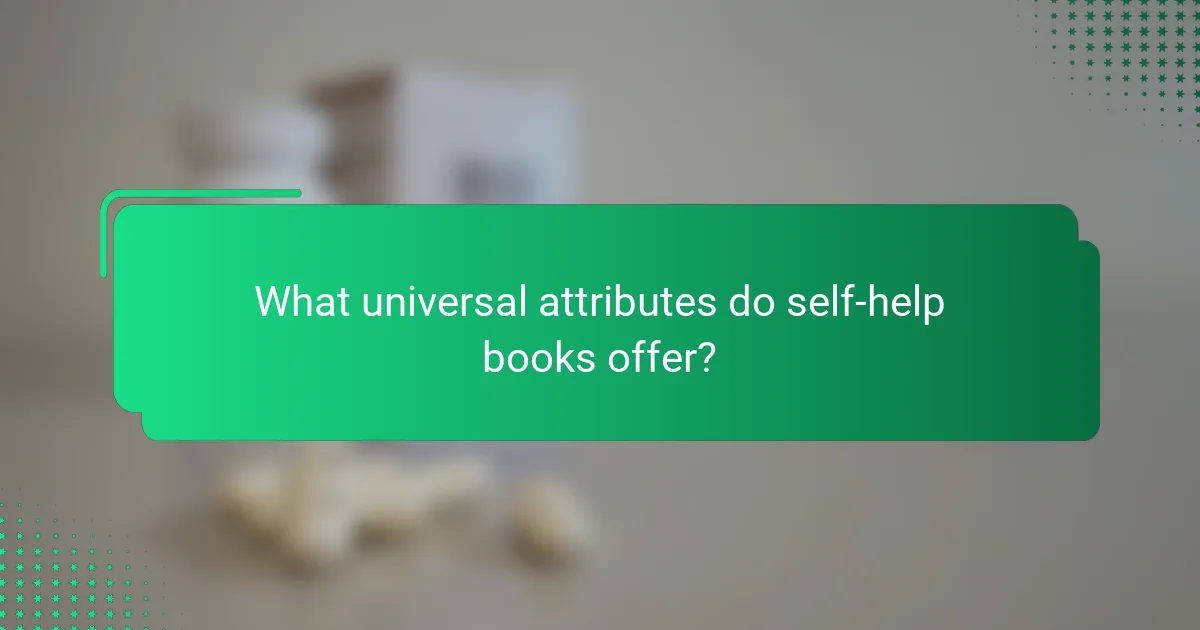
What universal attributes do self-help books offer?
Self-help books for women universally offer empowerment, practical strategies, emotional support, and personal growth. These attributes help transform money mindsets and boost financial confidence. Many books include actionable steps, relatable stories, and expert advice, making them accessible and relatable. The unique attribute of targeting women’s financial challenges enhances their relevance and effectiveness.
How do they promote financial literacy among women?
Self-help books for women promote financial literacy by providing practical guidance and empowering narratives. They cover essential topics such as budgeting, investing, and overcoming money-related fears. These books often feature relatable stories and actionable steps that resonate with women’s unique financial experiences. By fostering a supportive community, they help women build confidence in their financial decisions.
What strategies do they suggest for overcoming money anxiety?
To overcome money anxiety, self-help books for women suggest strategies such as reframing negative thoughts, setting realistic financial goals, and practicing mindfulness. These approaches enhance financial confidence and promote a positive money mindset. Engaging with supportive communities can also provide encouragement and accountability. Regularly reviewing financial progress fosters a sense of control and reduces anxiety.
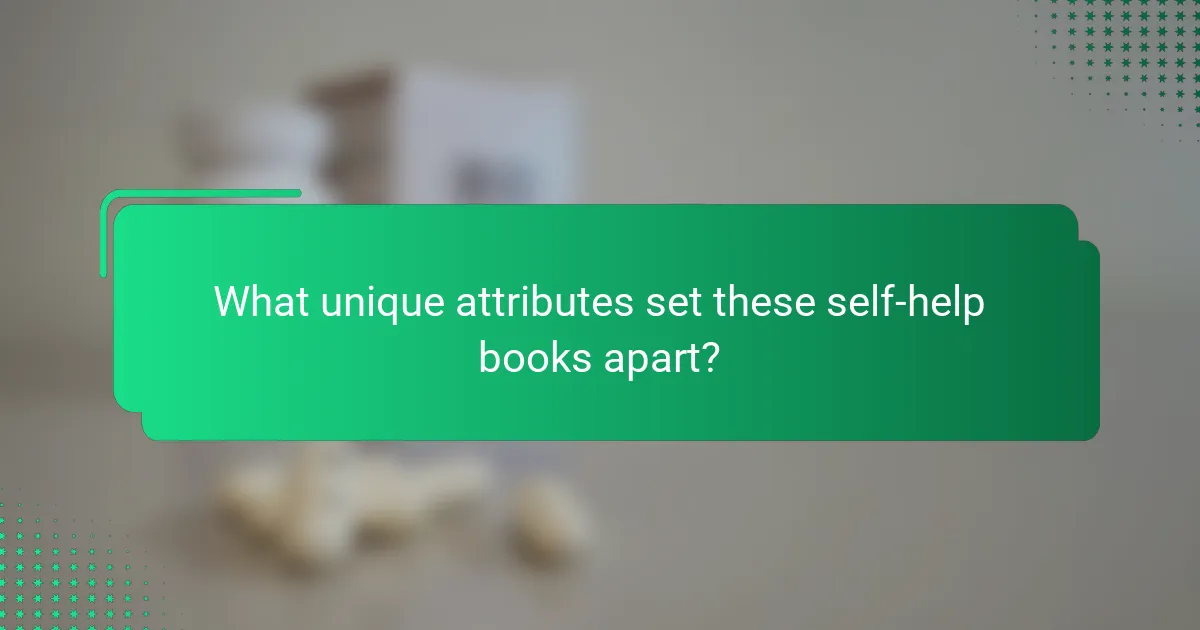
What unique attributes set these self-help books apart?
Self-help books for women that transform money mindset and boost financial confidence stand out due to their unique attributes. These books often incorporate personal anecdotes, relatable experiences, and practical exercises tailored specifically for women. They frequently address societal pressures and challenges women face in financial contexts, offering targeted strategies for overcoming these obstacles. Additionally, they emphasize community support and empowerment, fostering a sense of belonging among readers. This focus on emotional intelligence and mindset shifts distinguishes them from traditional financial literature.
How do they cater specifically to women’s financial experiences?
Self-help books for women focus on unique financial experiences by addressing gender-specific challenges. They often explore topics like income disparity, financial independence, and confidence-building. These books provide practical strategies tailored to women’s needs, such as budgeting techniques and investment advice, ultimately empowering them to take control of their finances. Additionally, they foster a supportive community, encouraging women to share experiences and learn from one another.
What innovative frameworks do they introduce for money management?
Self-help books for women introduce innovative frameworks for money management by focusing on mindset transformation and practical strategies. These frameworks emphasize emotional intelligence, goal-setting, and practical budgeting techniques. For instance, many books advocate for a holistic approach that combines self-reflection with actionable steps, such as tracking expenses and setting realistic financial goals. This blend of psychological and practical tools fosters financial confidence and encourages sustainable money habits.
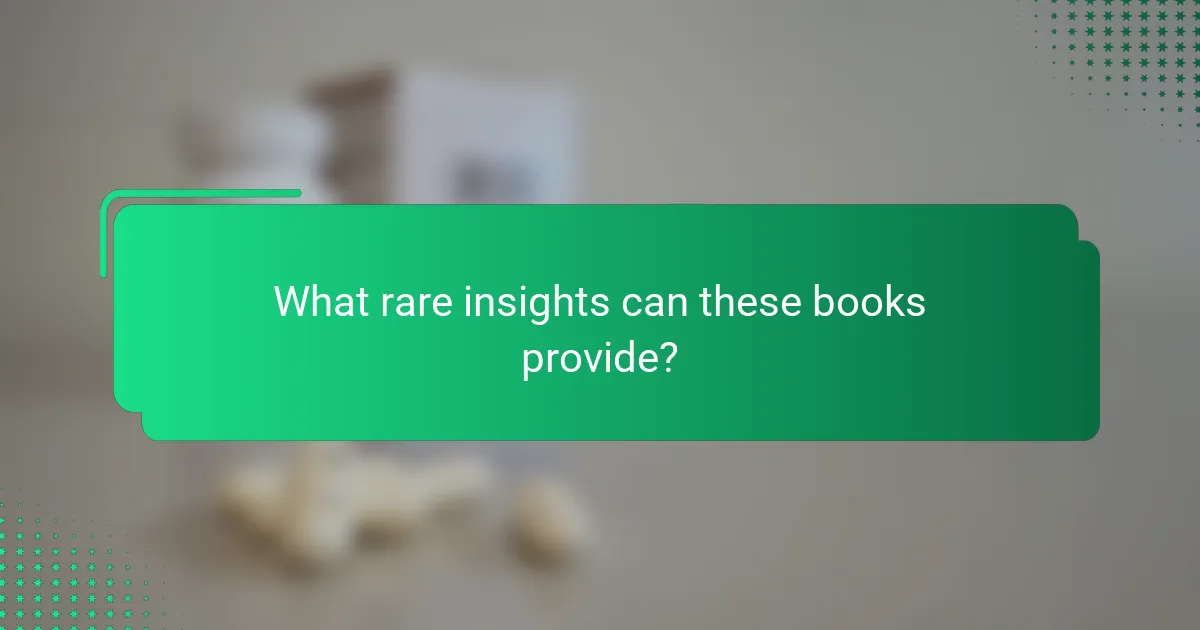
What rare insights can these books provide?
Self-help books for women can provide rare insights into overcoming financial barriers and developing a positive money mindset. These books often share unique strategies tailored specifically for women, addressing challenges like wage gaps and societal expectations. They may offer personal anecdotes and case studies that resonate deeply, fostering a sense of community and shared experience. Additionally, these resources can highlight lesser-known financial tools and investment strategies that empower women to take control of their financial futures.
How do they address the intersection of gender and finance?
Self-help books for women address the intersection of gender and finance by empowering women to overcome financial barriers. These books often highlight unique attributes like financial independence, confidence building, and tailored strategies. For instance, they provide insights on investing, budgeting, and negotiating salaries, which are crucial for women’s financial growth. By focusing on these aspects, the literature fosters a supportive community, encouraging women to share experiences and strategies. Ultimately, this approach transforms mindsets and promotes financial literacy among women, bridging the gender gap in financial knowledge.
What uncommon practices do they recommend for building wealth?
Self-help books for women often recommend unconventional practices for building wealth. These include embracing a growth mindset, prioritizing financial education, and leveraging community support. Women are encouraged to challenge societal norms around money, invest in self-care as a means of productivity, and create vision boards to visualize financial goals. Additionally, practicing gratitude for current financial situations can lead to better money management. These unique approaches can significantly transform one’s money mindset and boost financial confidence.
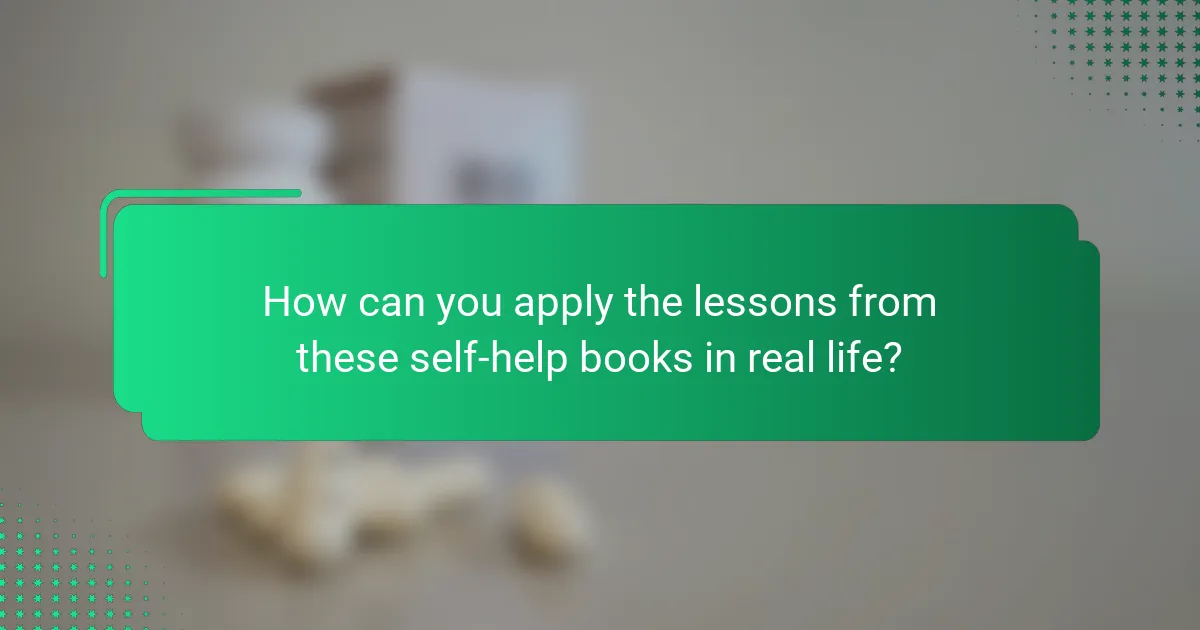
How can you apply the lessons from these self-help books in real life?
To apply lessons from self-help books in real life, start by identifying key principles that resonate with your financial mindset. Implement actionable strategies, such as budgeting techniques and positive affirmations, to reshape your approach to money. Regularly reflect on your progress to build confidence and maintain motivation. Engage with communities or accountability partners to reinforce your commitment to financial growth.
What are the best practices for implementing a new money mindset?
To implement a new money mindset, focus on self-education through targeted self-help books for women. Start by identifying your financial beliefs and challenging negative thought patterns. Engage with practical exercises that promote financial confidence and awareness. Seek community support through workshops or online forums to share experiences and strategies. Regularly track your financial progress to reinforce positive changes and celebrate milestones.
What common mistakes should you avoid when changing your financial habits?
To effectively change your financial habits, avoid common mistakes such as setting unrealistic goals, neglecting to track spending, and failing to educate yourself. These errors can hinder your progress and undermine your financial confidence. Focus on setting achievable goals, regularly monitoring your finances, and utilizing self-help books designed for women to enhance your money mindset. This approach fosters a sustainable transformation in your financial habits.
How can you measure your progress in boosting financial confidence?
To measure progress in boosting financial confidence, track specific financial behaviors and mindset shifts. Regularly assess your budgeting skills, savings habits, and investment knowledge.
Use self-reflection journals to document feelings about money and identify changes in your financial mindset. Set measurable goals, such as increasing savings by a certain percentage or reducing debt.
Engage with self-help books designed for women, focusing on transformative strategies that enhance financial literacy and confidence. Regularly review your progress against these goals to ensure continuous improvement.
